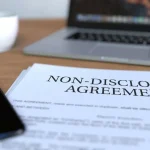

Non-Disclosure Agreement: A Guide on What it is and When You Need One
23/10/2024Abuse of Dominance
23/10/2024



Every female employee is entitled to 12 weeks of paid maternity leave provided she notifies her employer in writing about her looming confinement. The notice of confinement is to be signed by a medical officer or a registered nurse and midwife, confirming that in his opinion, the employee’s confinement will probably take place within 6 weeks immediately after the date of the certificate. Where the female employee concerned fails to deliver a medical certificate signed by a medical officer, or a registered nurse and midwife then she shall not be entitled to maternity allowance and other maternity benefits
Once the employer receives the employee’s notice, the employer is required to grant the employee permission to absent herself from
work until her maternity period ends.
A female employee is also obligated to inform her employer of her date of confinement within 21 days immediately after her
confinement by simply providing her employer with a written certificate signed by a medical officer or a registered nurse or
midwife confirming that date.
The maternity leave may be extended to 8 weeks following confinement, where the female employee, immediately after her confinement period ends, delivers a written certificate signed by a medical officer or a registered nurse and midwife setting out his opinion that the female employee in question is suffering from an illness arising from the confinement which renders her unfit for duty.
The employee is entitled to at least 50% of her basic salary and benefits during the maternity leave period. It must also be noted that, an employer is not entitled to issue a female employee with a notice of termination during her confinement period, and the termination of employment of a female employee on confinement does not affect the employer’s obligation to pay the employee her maternity benefits.

Copyright 2023 EasyLaw. EasyLaw is not a lawyer, or a law firm and does not engage in the practice of law. EasyLaw cannot and does not provide legal advice or legal representation. All information, software and services provided on the site are for informational purposes and self-help only and are not intended to be a substitute for a lawyer or professional legal advice. Use of this site is subject to our Terms of Use.
Tell us about your legal needs and we’ll get in touch shortly.
